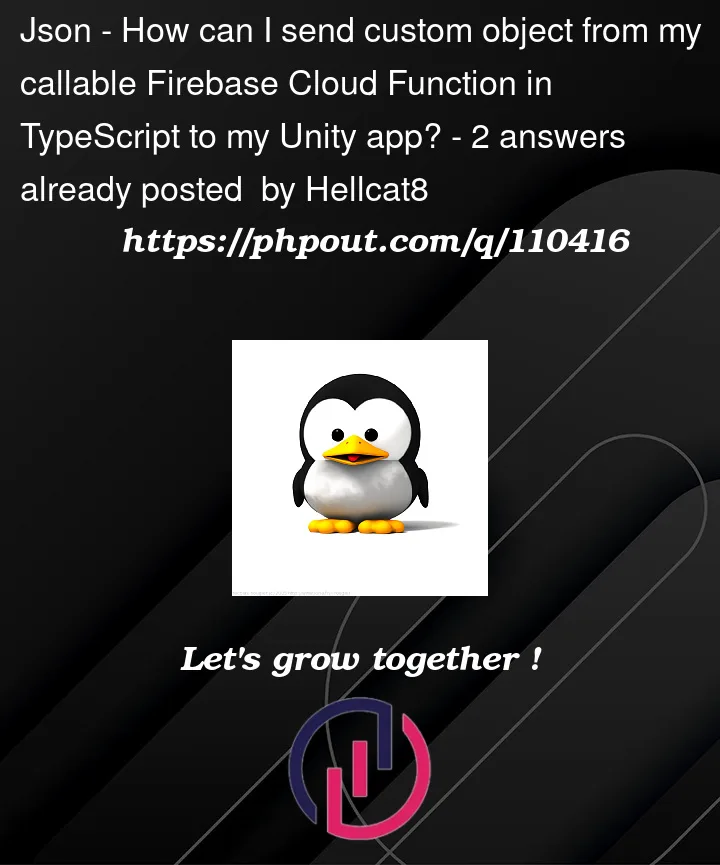I’m trying to use Firebase and its callable Cloud Functions for my Unity project.
With the docs and different posts I found on the web I struggle to understand how returning data works. (I come from Azure Functions in C#)
I use TypeScript, and try to return a custom object CharactersResponse:
export class CharactersResponse //extends CustomResponse
{
Code!: CharactersCode;
CharacterID?: string;
}
export enum CharactersCode
{
Success = 0,
InvalidName = 2000,
CharacterNameAlreadyExists = 2009,
NoCharacterSlotAvailable = 3000,
InvalidCharacterClass = 4000,
EmptyResponse = 9000,
UnknownError = 9999,
}
(Custom Response is a parent class with only an UnknownErrorMessage string property, that I use for adding extra message when needed, but only in Unity. I don’t need it in my functions.)
I have the same in my C# Unity Project:
public class CharactersResponse : CustomResponse
{
public CharactersCode Code;
public string CharacterID;
}
public enum CharactersCode
{
Success = 0,
InvalidName = 2000,
CharacterNameAlreadyExists = 2009,
NoCharacterSlotAvailable = 3000,
InvalidCharacterClass = 4000,
EmptyResponse = 9000,
UnknownError = 9999,
}
I’m still learning but I found it useful to do this way for displaying correct messages in Unity (and also regarding localization).
When the Code is 0 (Success), I will usually need to get some data at the same time like in this example CharacterID, or CharacterLevel, CharacterName etc.. CharacterResponse will be used for all functions regarding Characters like "GetAllCharacters", "CreateNewCharacter" etc..
My Function (CreateNewCharacter) looks like this:
import * as functions from "firebase-functions";
import { initializeApp } from "firebase-admin/app";
import { getFirestore } from "firebase-admin/firestore";
import { CharactersResponse } from "./CharactersResponse";
import { CharactersCode } from "./CharactersResponse";
import { StringUtils } from "../Utils/StringUtils";
// DATABASE INITIALIZATION
initializeApp();
const db = getFirestore();
// CREATE NEW CHARACTER
export const CreateNewCharacter =
functions.https.onCall((data, context) =>
{
// Checking that the user is authenticated.
if (!context.auth)
{
// Throwing an HttpsError so that the client gets the error details.
throw new functions.https.HttpsError('failed-precondition', 'The function must be called ' +
'while authenticated.');
}
// TEST
data.text = '';
// Authentication / user information is automatically added to the request.
const uid: string = context?.auth?.uid;
const characterName: string = data.text;
// Check if UserID is present
if (StringUtils.isNullOrEmpty(uid))
{
// Throwing an HttpsError so that the client gets the error details.
throw new functions.https.HttpsError('failed-precondition', 'Missing UserID in Auth Context.');
}
const response = new CharactersResponse();
if (StringUtils.isNullOrEmpty(characterName))
{
response.Code = CharactersCode.InvalidName;
console.log("character name null or empty return");
return response; // PROBLEM IS HERE *****************
}
console.log("end return");
return "Character created is named : " + characterName + ". UID = " + uid;
});
In Unity, the function call looks like this:
private static FirebaseFunctions functions = FirebaseManager.Instance.Func;
public static void CreateNewCharacter(string text, Action<CharactersResponse> successCallback, Action<CharactersResponse> failureCallback)
{
Debug.Log("Preparing Function");
// Create the arguments to the callable function.
var data = new Dictionary<string, object>();
data["text"] = text;
// Call the function and extract the operation from the result.
HttpsCallableReference function = functions.GetHttpsCallable("CreateNewCharacter");
function.CallAsync(data).ContinueWithOnMainThread((task) =>
{
if (task.IsFaulted)
{
foreach(var inner in task.Exception.InnerExceptions)
{
if (inner is FunctionsException)
{
var e = (FunctionsException)inner;
// Function error code, will be INTERNAL if the failure
// was not handled properly in the function call.
var code = e.ErrorCode;
var message = e.Message;
Debug.LogError($"Code: {code} // Message: {message}");
if (failureCallback != null)
{
failureCallback.Invoke(new CharactersResponse()
{
Code = CharacterCode.UnknownError,
UnknownErrorMessage = $"ERROR: {code} : {message?.ToString()}"
});
}
}
}
}
else
{
Debug.Log("About to Deserialize response");
// PROBLEM IS HERE *********************
CharactersResponse response = JsonConvert.DeserializeObject<CharactersResponse>(task.Result.Data.ToString());
Debug.Log("Deserialized response");
if (response == null)
{
Debug.LogError("Response is NULL");
}
else
{
Debug.Log("ELSE");
Debug.Log($"Response: {response}");
Debug.Log(response.Code.ToString());
}
}
});
}
The problem :
In my Unity C# code, task.Result.Data contains the CharactersCode I’ve set in my function, but I can’t find a way to convert it to CharactersResponse. (It worked in Azure Functions). Moreover, the line just after Deserialization Debug.Log("Deserialized response"); is not executed. The code seems stuck in the deserialization process.
I tried with and without extending my TypeScript class with CustomResponse(because I don’t need it in my Function so I didn’t extended it at first).
I also tried setting a CharacterID because I thought maybe it didn’t like the fact that this property was missing but the result is the same.
I don’t understand what is the problem here? If any of you can help.
Thanks.




2
Answers
I wanted to implement derHugo's solution but couldn't find a way to convert
task.Result.DatatoDictionary<string, object>. The code was stuck atvar result = (Dictionary<string, object>)task.Result.Data;even in step by step debugging and no error popped up.OLD SOLUTION:
So I did a little research and stumbled upon this post and ended up using this instead :
I basically convert the
task.Result.Datato JSON and convert it back toCharactersResponseand it works. I have what I wanted. However, I seem to understand that it is not the best solution performance-wise, but for now it is okay and I can now move forward in the project, I'll try to find a better solution later.NEW SOLUTION:
I wanted to try one last thing, out of curiosity. I wondered what if I convert to JSON at the beginning (in my function) instead of at the end (in my Unity app). So I did this in my function's TypeScript code:
In my C# code, I retried this line of code:
And it works ! I just needed to convert my object to JSON in my function before returning it. It allows me to "save" one line of code to process on the client side compared to the old solution.
Thanks derHugo for your answer as it helped me finding what I want.
HttpsCallableResult.Datais of typeobject!=> Your
ToStringwill simply return the type name something likeor in your case the result is a dictionary so it prints out that type.
=> This is of course no valid JSON content and not what you expected.
Simply construct the result yourself from the data: